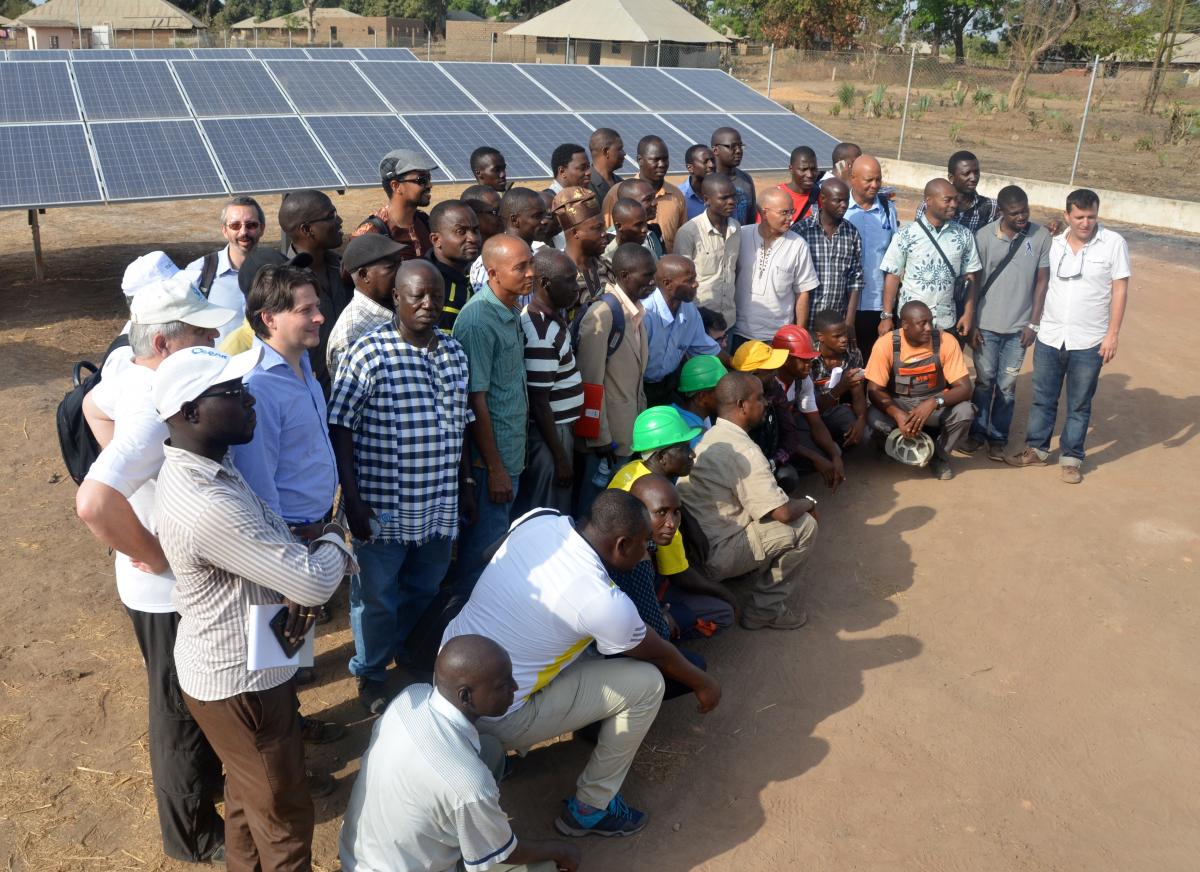The United Nations Industrial Development Organization (UNIDO) in partnership with the General Directorate for Natural Resources and Energy (DGRNE) of the Ministry of Infrastructure and Natural Resources (MIRN, former MOPIRNA) and the National Designated Authority (NDA) at the Ministry of Planning, Finance and Blue Economy (MPFEA) are implementing the GCF readiness project “Building institutional capacity for a renewable energy and energy efficiency investment programme for São Tomé and Principe”. 
It is being executed in close coordination with the ongoing GEF funded UNIDO project “Strategic program to promote renewable energy and energy efficiency investments in the electricity sector of São Tomé and Príncipe”. Both projects contribute to the nation’s Vision 2030 “São Tomé e Príncipe 2030: the country we need to build", which aims to transform the country into a climate-resilient and vibrant island hub for blue economy business, financial services and tourism, benefitting from the growing regional market of the Economic Community of Central African States (ECCAS).
The success of the vision highly depends on a power sector reform and a transformational shift of the entire energy system from a nearly complete fossil fuel import dependency to renewable energy and energy efficiency. To address existing barriers and constraints, the Government has developed the National Renewable Energy Action Plan (NREAP) and the National Energy Efficiency Action Plan (NEEAP) with support of UNIDO. Both policies provide the Government with practical guidance on how to make the energy transition a reality by 2030 and 2050.
Apart from utility-scale generation plants, the NREAP identifies smaller distributed renewable energy (DRE) systems in rural and urban zones as priority solutions, including mini-grids, roof-top systems and industrial prosumers. However, so far this market segment remains largely unregulated, which creates a bottleneck for domestic of international investments. In addition to technical grid losses, the NEEAP defines the reduction of commercial grid losses as an important area of intervention. So far, the latter has not got much attention.
Therefore, to address these constraints, UNIDO seeks advisory support of a consultancy company or consortia for the development of a regulatory, legal and practical framework related to the reduction of non-technical commercial grid losses and the uptake of distributed renewable energy (DRE) systems in urban and rural contexts. The consultant can base its work on already existing documents developed by UNIDO, UNDP, AfDB, WB and other partners, including the UNIDO supported Clean Energy Mini-Grid Policy Development Guide, which is available in Portuguese. The scope and main objectives of the assignment are as follows:
- Develop a baseline assessment on non-technical commercial grid losses and energy saving potentials in urban and rural areas and identify gaps in the existing policy, regulatory and legal framework; assess the main causes for the behaviour of the various stakeholders in the electricity system;
- In line with international best practice of ISO/IEC/IEEE, propose modalities to address commercial grid losses and energy saving potentials, which are feasible and political view, as well as acceptable for the main players of the electricity system (ministry, utility, regulator and consumers);
- Based on the preferred option of the Government, adapt the existing legislation regarding commercial losses and energy saving and develop practical guidelines and templates to put the new gender-sensitive modalities into practice; provide advice to EMAE for the development of a program related to electricity theft and demand-side energy management;
- Develop a baseline assessment on DRE systems in urban and rural areas and identify gaps in the existing policy, regulatory and legal framework; identify the main barriers and risks for domestic and international investments in the sector; consider various types of DRE, including mini-grids, roof-top installation, as well as industrial prosumers;
- In line with international best practice of ISO/IEC/IEEE, propose attractive modalities and incentives for mini-grids and auto-producers, which are feasible in social and political view, as well as for the main players of the electricity system (ministry, utility, regulator and consumers) and potential domestic and international financers and investors;
- Based on the preferred option of the Government, adapt the existing legislation regarding DRE systems, including for mini-grids, roof-top installations and industrial auto-producers, and develop practical guidelines and templates to put the new modalities into practice; this includes templates for licences, concessions, permits, PPAs, as well as appropriate technical and quality of service regulations, including minimum standard requirements for applications, components, installation services, safety and environmental safeguards;
- Conduct (1) one training on modalities to reduce commercial grid losses and energy saving, as well as one (1) training on modalities and incentives for DRE, including mini-grids, roof-top systems, as well as industrial auto-producers
The lessons learned of this assignment will be disseminated within the ECCAS region through the Central African Centre for Renewable Energy and Energy Efficiency (CEREEAC), located in Luanda, Angola, as well as the Global Network of Regional Sustainable Energy Centres (GN-SEC).
Qualified and interested bidders are invited to apply by 30 January 2023 17:00:00 CET. Further information you find at: https://www.unido.org/resources-procurement/procurement-opportunities
Procurement expired

